Remembering my travels, I will return today to sunny South Arica. Its flora and fauna are diverse and interesting for those who do not live on this continent, and today I will continue to talk about the colony of African penguin in the Simon's Town, near the city of Cape Town.
Usually, when talking about this colony of penguins, everyone mentions Boulders Beach, after which the colony itself is named Boulders Penguin Colony. It is a beautiful beach with huge boulders, where you can walk and even swim with the penguins after paying a little entrance fee. I already wrote more about it here.
But the heart of the colony — the place where penguins nest, hatch eggs and chicks — is located a little further, on another beach called Foxy beach.
This is a small sandy beach, to enter which, as well as to the Boulders beach, you need to purchase a ticket, or rather, a ticket bought at the ticket office of one of two beaches is common and is valid for both — buying it once, you can go to the both.
However, Foxy Beach, unlike Boulders Beach, is completely penguin territory, where people can only move along a fenced trail ending with an observation deck, from where we can watch the beach and its inhabitants, but we cannot get off on the sand so as not to disturb them. And this is good, because here, in addition to independent adult birds, there are nesting penguins and defenseless chicks.
African penguins are interesting and unusual birds. In addition to the obvious fact that they do not live in the snow, but in quite a warm and even sometimes hot climate, it was unexpected for me to see their nests. To lay eggs, they dig small holes in the ground or sand, while a smaller part does it in bushes, the most of them nest right on the beach, just in the sand!
Some penguins dig not just holes in the sand, but small caves or burrows. But here I saw very few of them. And it looks very unusual.
Well, sometimes people who look after the colony put special containers for them, which penguins use as a nest. For example, here is one of these.
The nesting period is several months (for example, May-July, but depending on the location of the colony, the months may be different), when almost all penguins, usually spending most of their time in the water, return to their permanent place on the shore.
During this period, a fairly large area of Foxy Beach is dotted with figures of lying penguins, incubating eggs or guarding their young chicks in holes in the sand.
After all, such babies need to be warmed and fed, and protected from possible dangers.
In the nest, they huddle together and even lie on each other — probably this way it is warmer and more comfortable :)
After birth, the chicks do not look very much like adult penguins: they are covered with brown down, very voluminous. I think it warms the babies well, but it is clearly not suitable for staying in the water. Therefore, for the first few months the chicks do not get there.
By the end of childhood, brown down is replaced by white and gray-black-blue feathers, which are already suitable for swimming in water.
Such half-fluffy penguins, which have not yet completely replaced baby down, look pretty funny.
Here is quite a large and well-fed chick still completely in baby brown down, and next to it there are chicks of the same size, but already almost fledged.
It's funny that at the same time there are penguins, still hatching eggs, and small chicks, and almost adult chicks.
A real kindergarten with children of different ages! Well, with adults looking after them, of course :)
The first reproduction begins at the age of about four or five years with a life expectancy of about 10-30 years.
By the way, African penguins form quite persistent pairs, most of the pairs (although not all) continue to stay together and have offspring together from year to year.
Both the male and the female take turns incubating the laid eggs for about 40 days, without leaving the nest empty — while one is hunting, the other is in the nest. The same continues for several weeks after the chicks hatch.
After this period, both parents go to sea for food for themselves and their children (they feed on fish, sometimes squid and crustaceans), leaving the grown chicks alone, so they stray into groups, which are called nurseries - together they are safer.
In addition to land-based enemies such as some predators, feral cats, people (who collected eggs due to which the population has decreased to a critical one), some birds including seagulls pose a danger to eggs and young chicks. And it's easier to defend against them in a group.
Parents feed their chicks for 2-4 months. I wonder how do they not lose each other? But this is for us they are all alike, and they certainly distinguish each other with ease and will always find their cub.
By the end of this period, the chicks have molted into their first adult plumage, which will allow them to start hunting in the sea themselves. After that, they go to sea for a period of 1-2 years.
This is what their first adult outfit looks like.
But this is not the final appearance, we can find many differences from the plumage of adult penguins: the coloring is less bright and contrast, including the characteristic feature of this species - a black strip in the form of a horseshoe on the white breast, and the thermoregulatory glands around eyes that turn pink when the penguins need to cool off.
Apparently, these features are not yet needed by young penguins, since they will be in a rather cold ocean for a long time until they grow there into adult birds. Just after the first return of the penguins to the shore in their colony, they molt again, now getting their permanent adult plumage of contrasting black and white feathers with clearly defined borders between these colors, with stripe and dots on the chest and abdomen, which, by the way, are unique for each individual, like our fingerprints.
While they molt, they cannot swim and hunt, so they are forced to constantly be on the shore in the company with adults incubating chicks.
During this time, they lose a lot of weight. But when it’s over, they become so handsome.
And in a couple of years they will be able to have their own chicks.
In general, when you are in the vicinity of Cape Town, be sure to drop by here. I recommend visiting both beaches, Foxy and Boulders, and be sure to walk along the trail between them — the Willis Walk trail, which is open to everyone for free.
Plan half a day for this activity, especially if you want to swim with them or take pictures of them. I think everybody will like both adults and baby penguins :)
It's better to watch the photo in high resolution.
OLYMPUS E-M1 Mark II
Exposure time: 1/800 sec
Aperture: F 4
Sensitivity: ISO 200
Focal length: 150 mm
35 mm equivalent: 300 mm
You can also see my photos in my blog LJ and in my profile on NatGeo

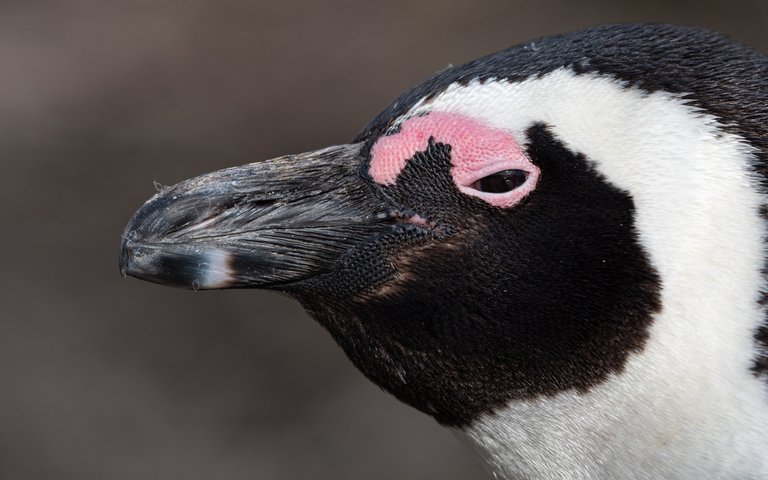
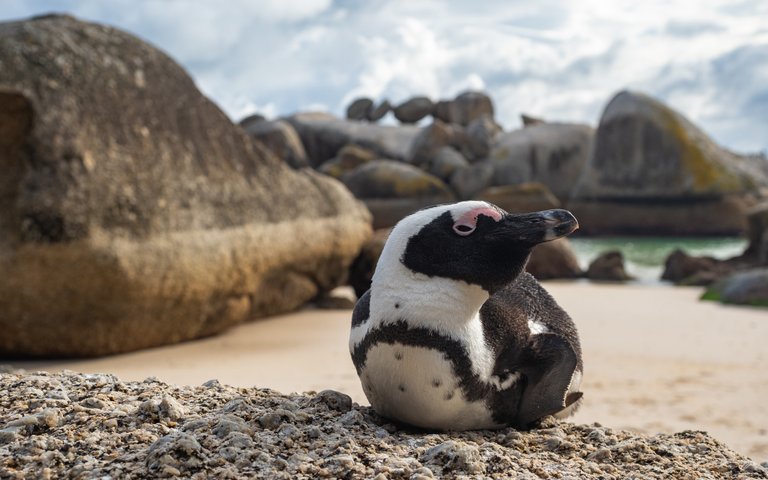
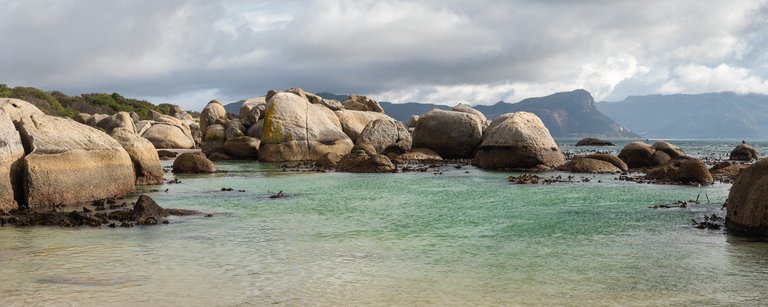
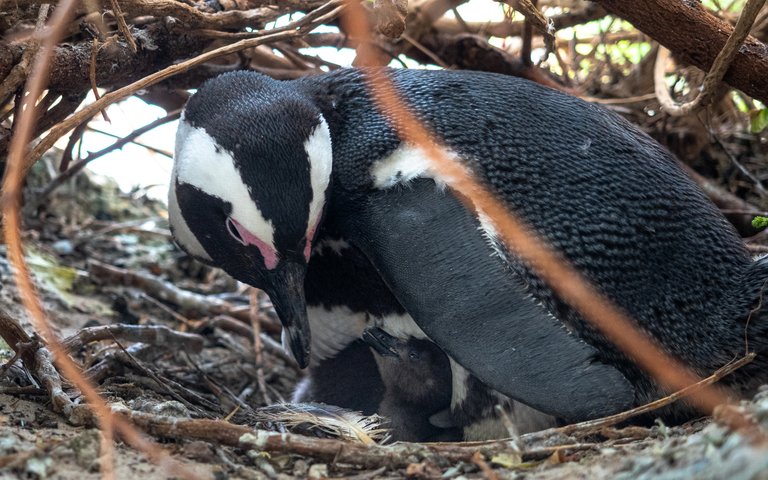
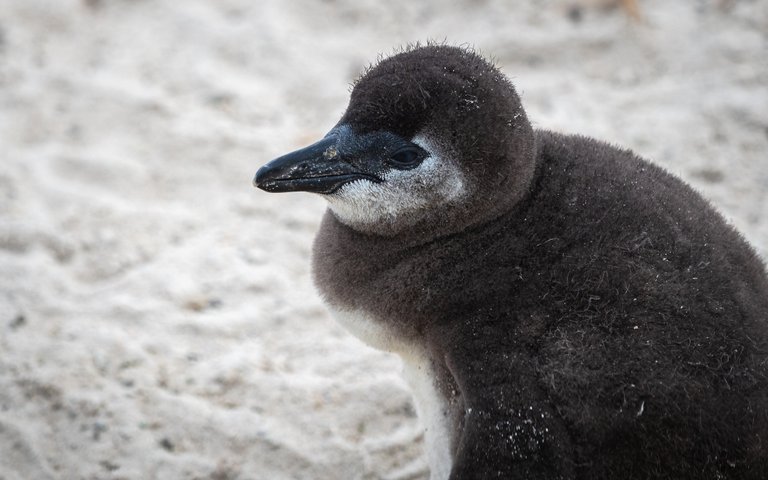
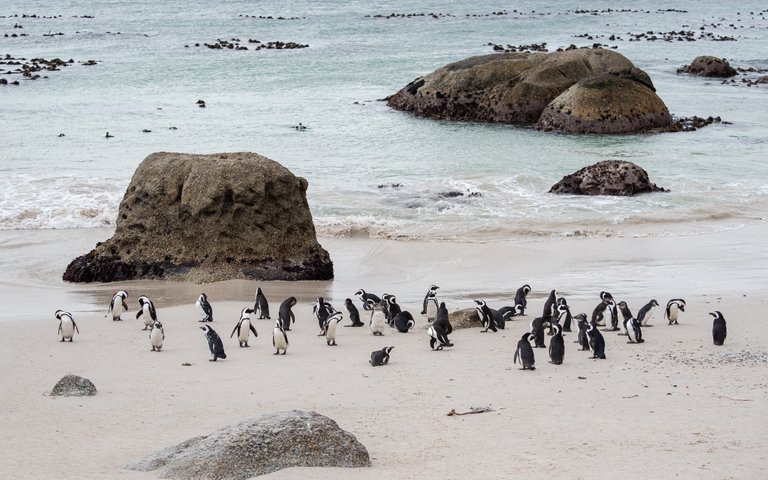
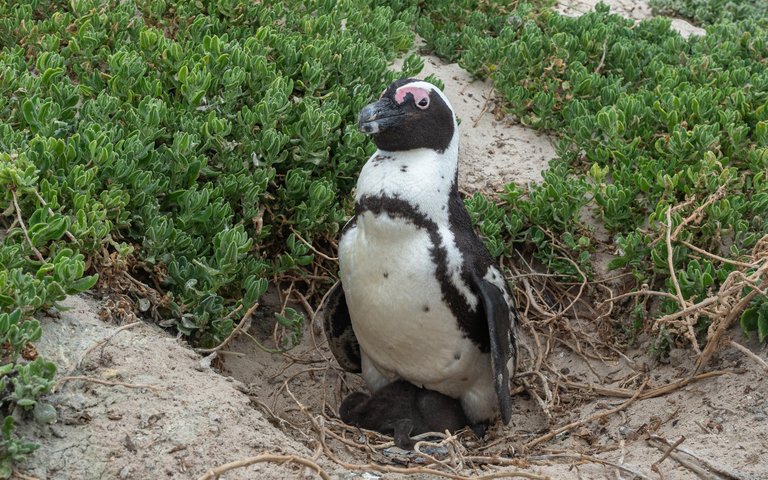
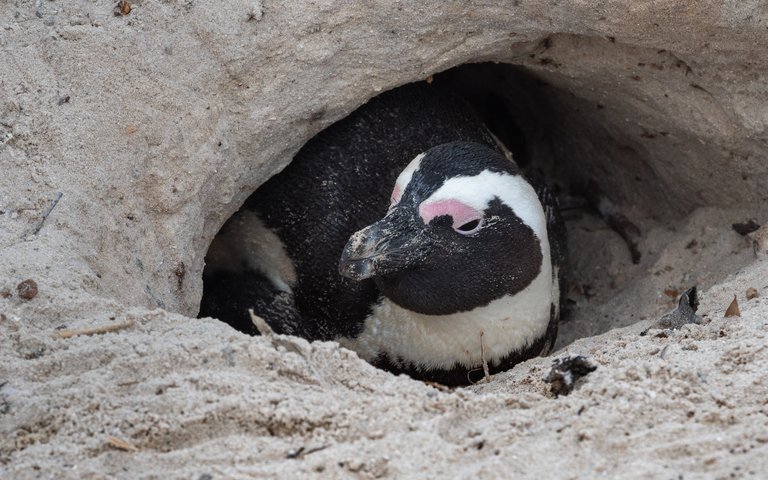
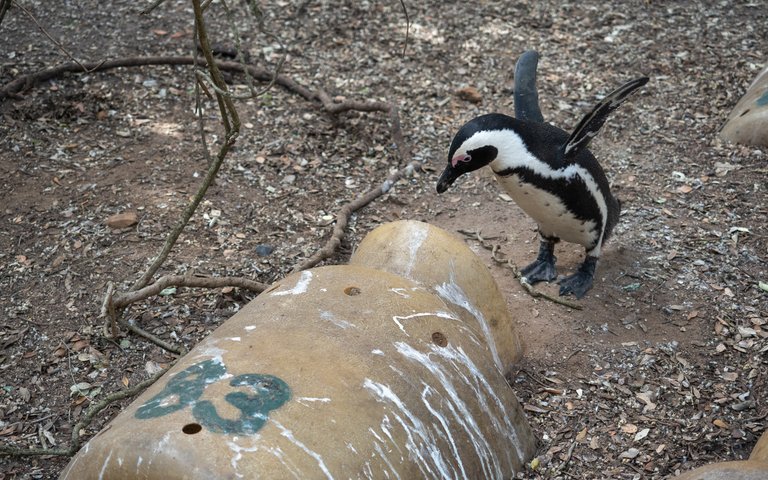


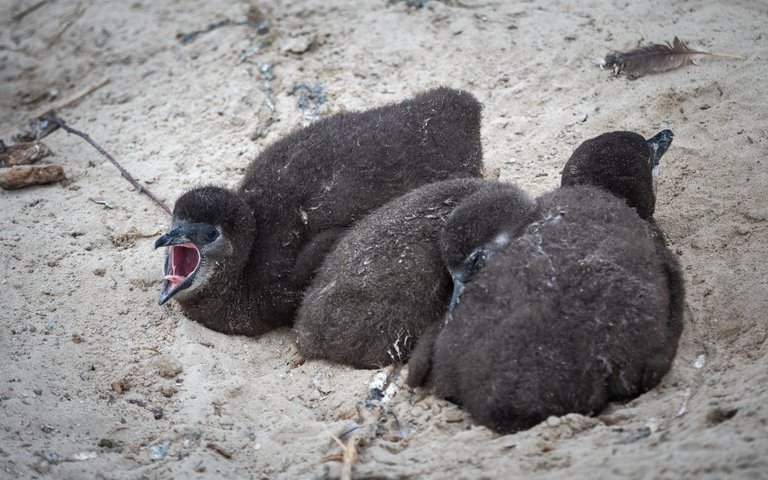
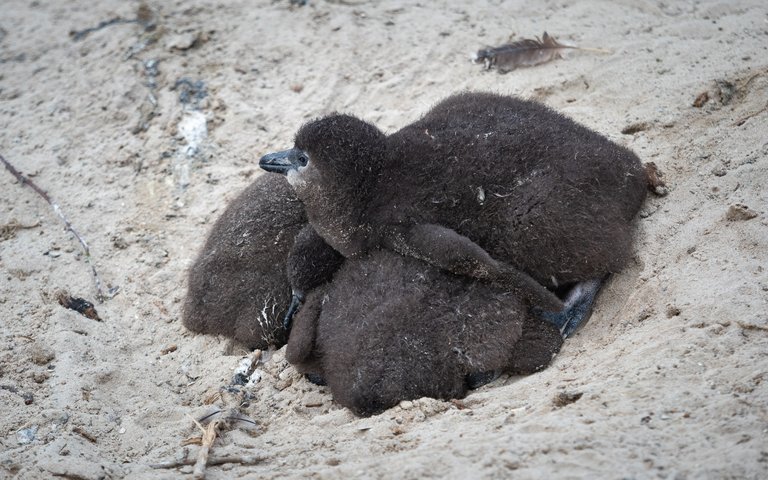
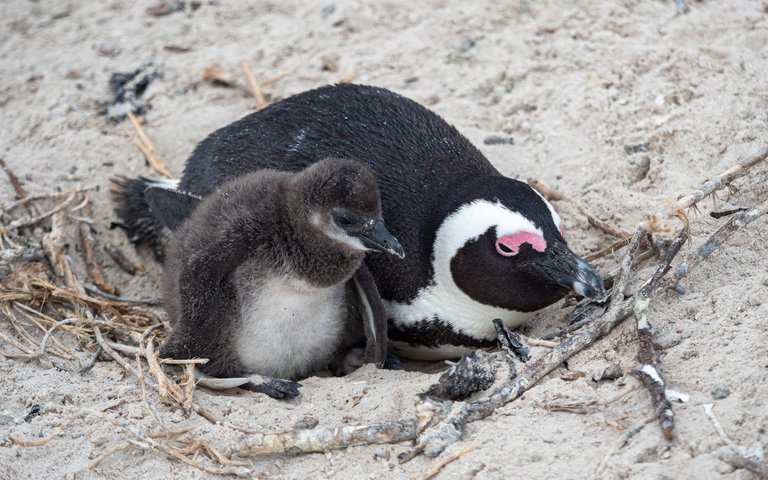
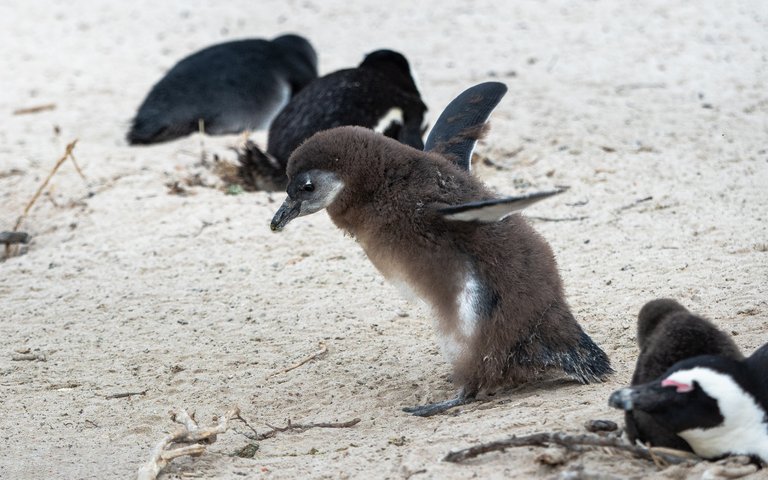
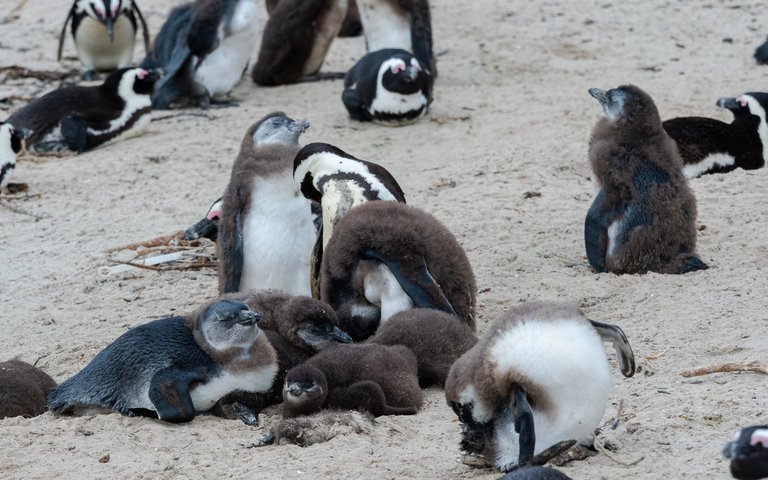
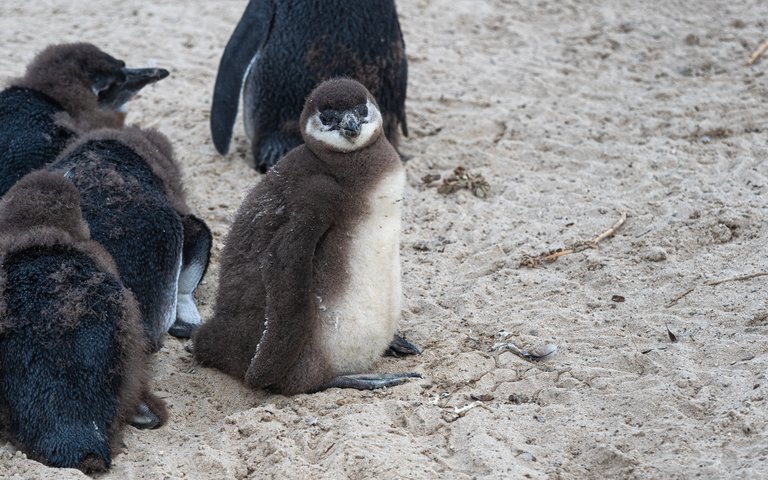
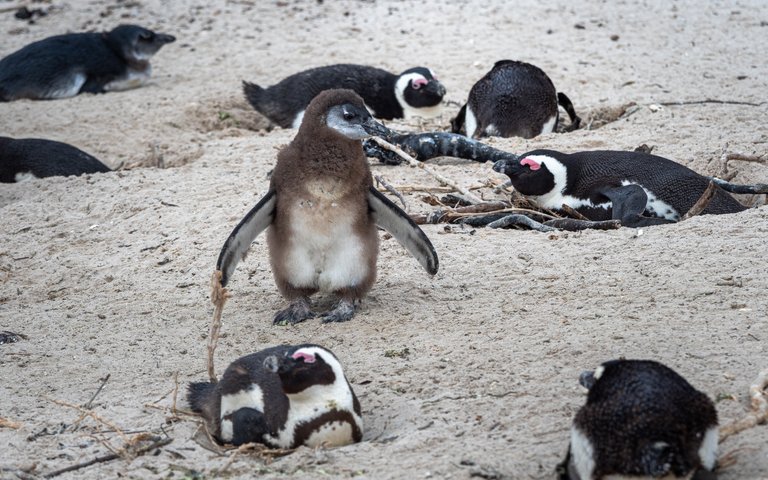
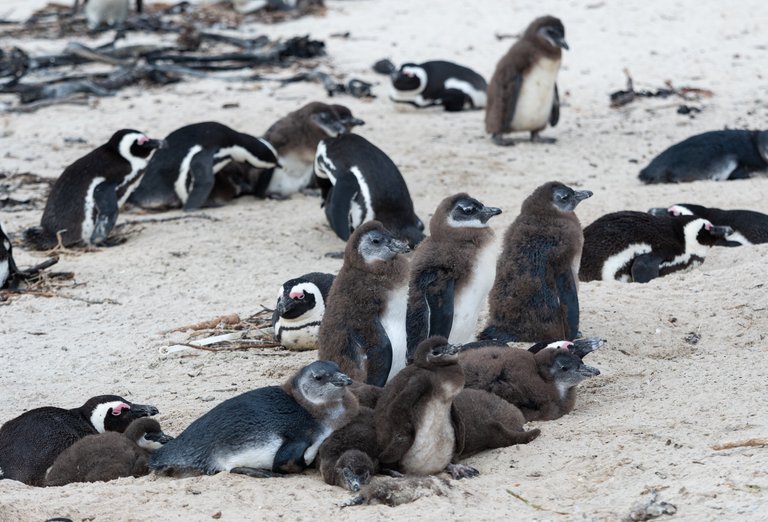
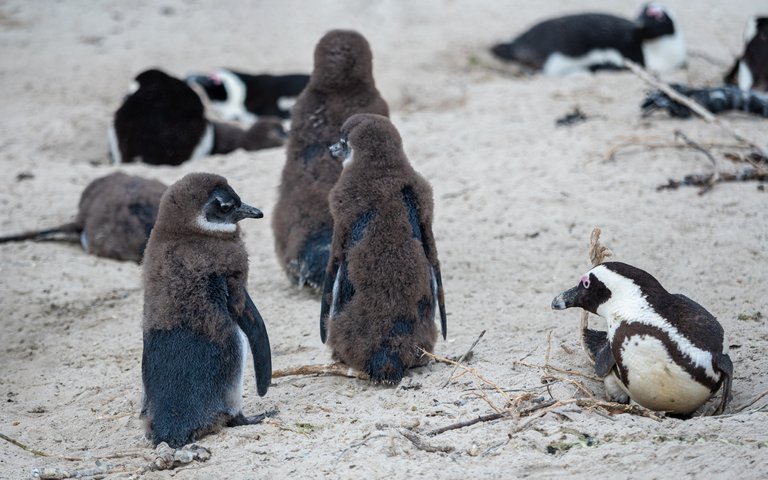
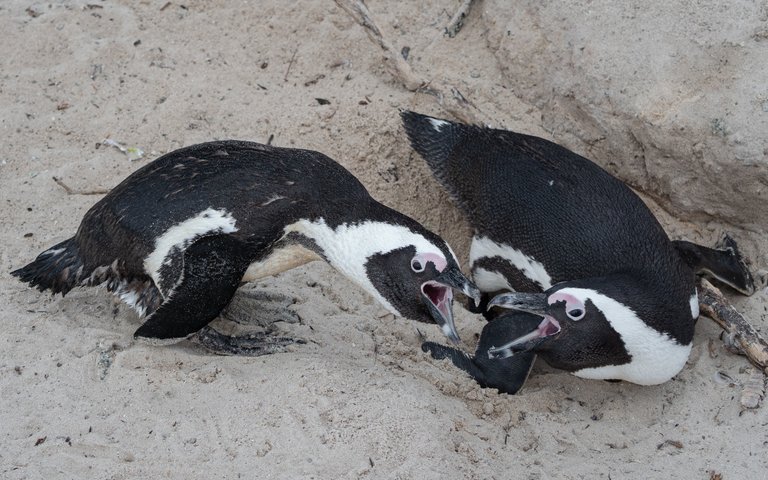
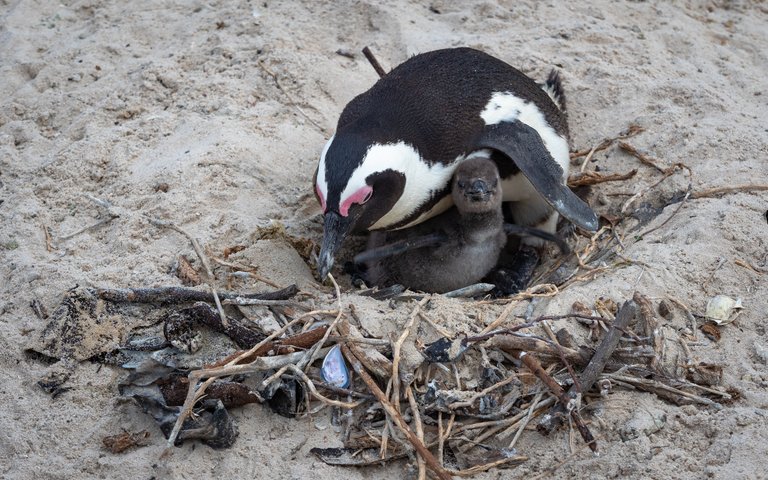
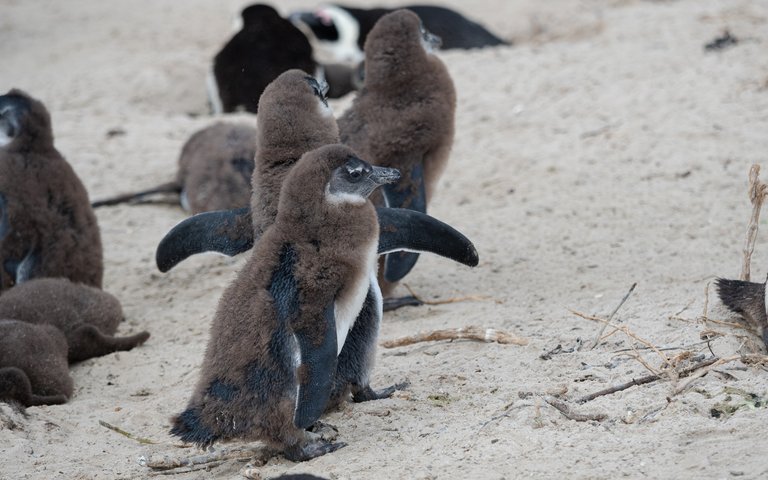
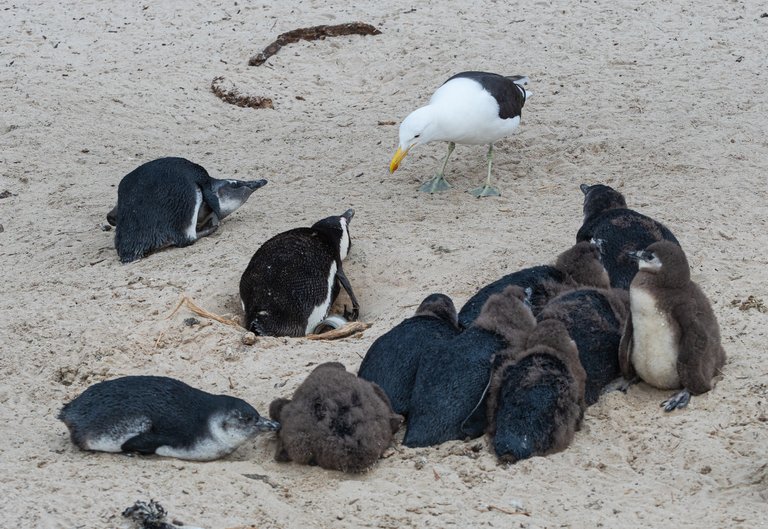
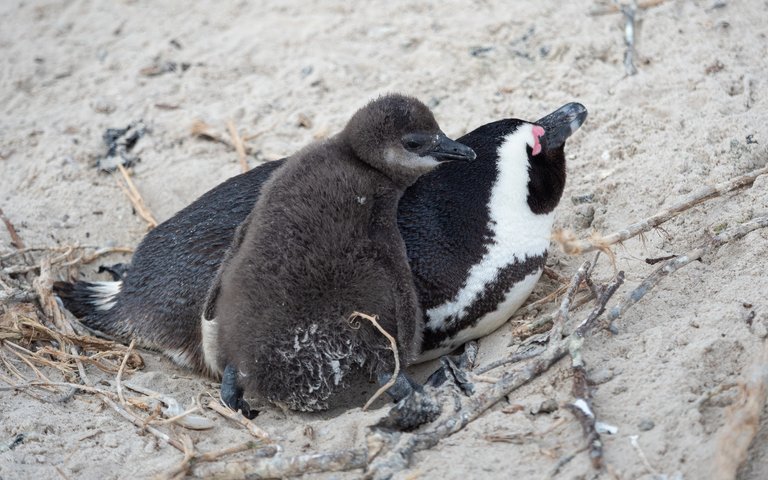
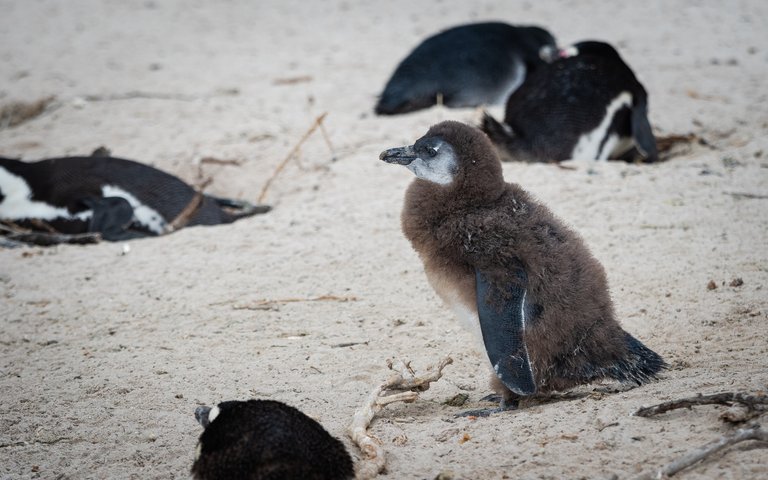
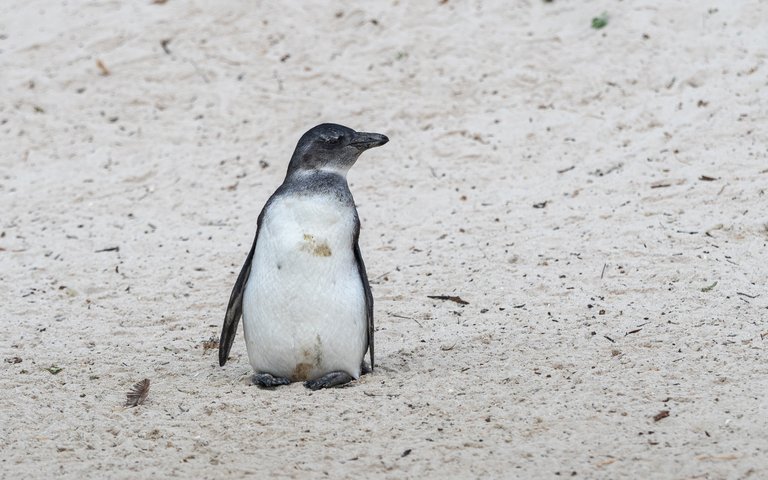
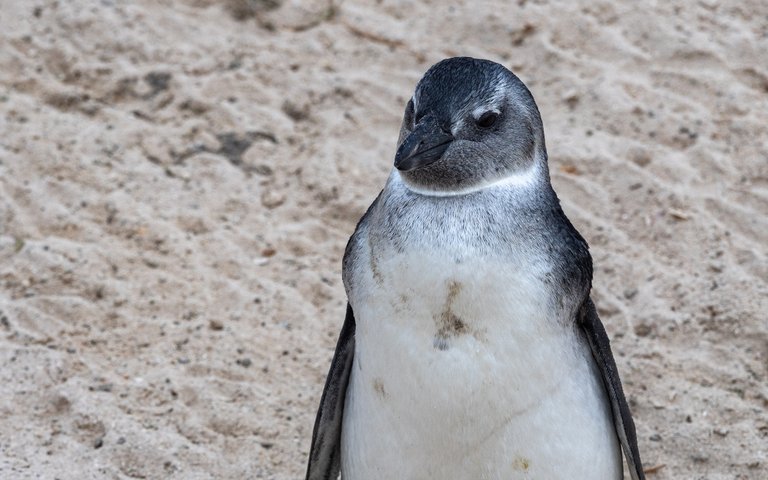
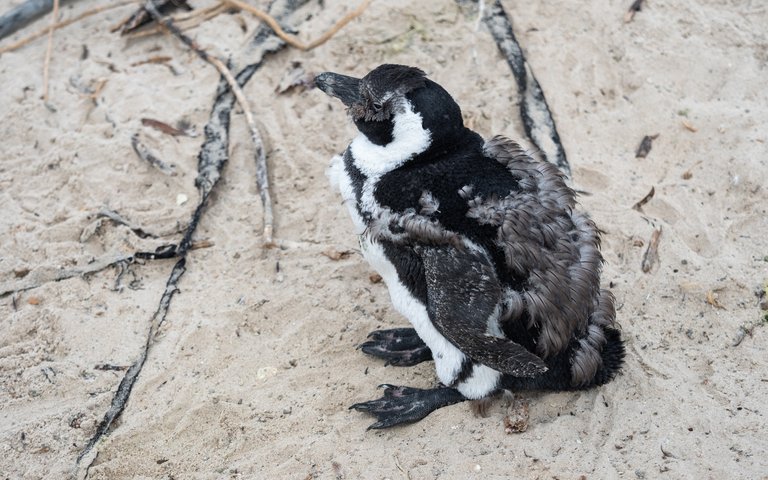
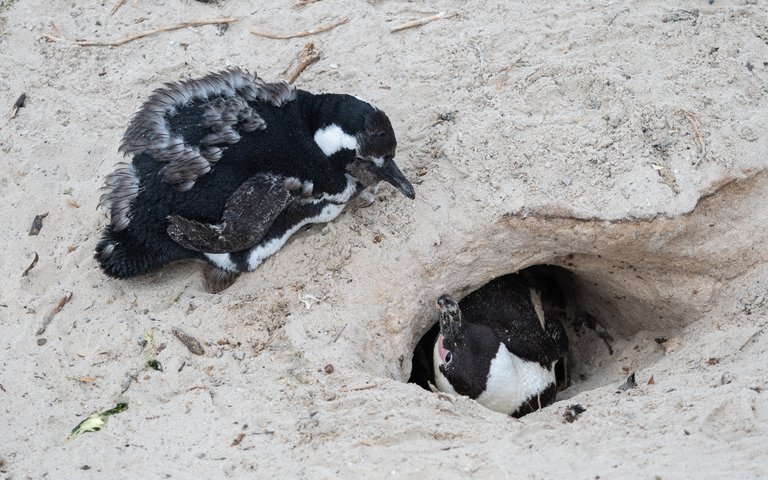
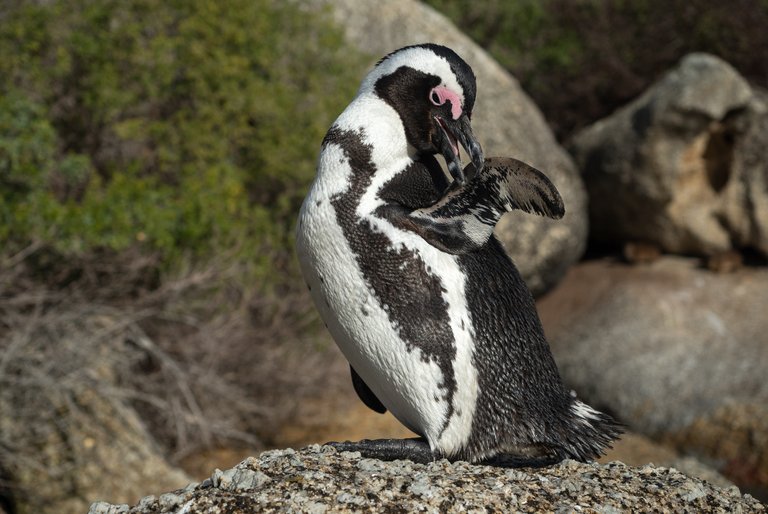
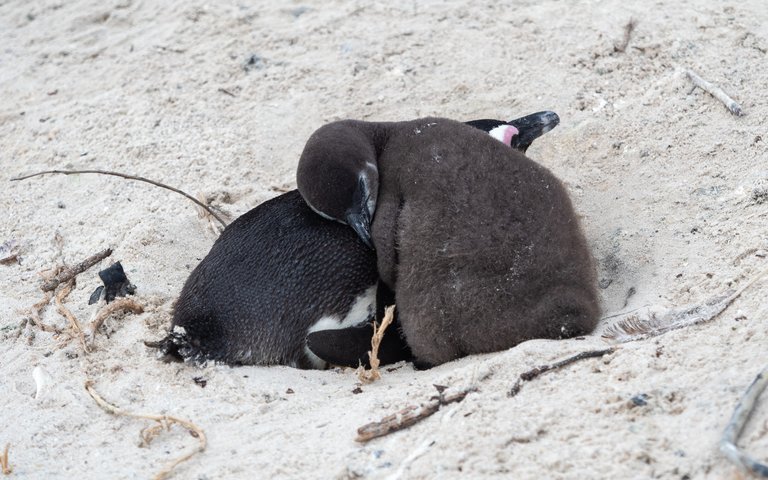
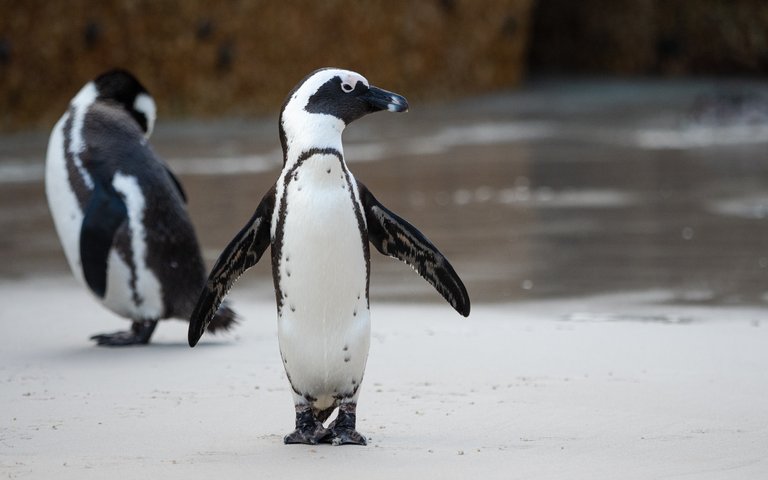

😍
I looked at them with the same eyes 😄
Congratulations, your post has been added to Pinmapple! 🎉🥳🍍
Did you know you have your own profile map?
And every post has their own map too!
Want to have your post on the map too?
Been to Clifton beach and the Penguin colony near Betty's Bay, but did not know about this little extra enclave.
Will certainly make a turn there some time.
A great post here my friend.
Oh really? I thought the Boulders Penguin Colony is one of the most famous coastal colonies in South Africa. Perhaps it is more popular with tourists, as it is located near the city of Cape Town and on the way to the Cape of Good Hope - it is convenient to stop off there on the road. We specially spent the night there to look at the penguins longer than an hour, and it was super :)
Thank you!
Sorry, no IT signal here yesterday.
Are you saying that you didn't know about the Betties Bay colony?
I did a full post on it between April and June lasy year.
It is indeed great to watch the little fellows.
Blessings!
No, I didn't know about this colony. Perhaps because I did not plan the route of that trip myself, or perhaps there is more information on the Russian-language Internet about the colony on Boulders Beach.
I think it's great to watch them in any of their colonies :)
Yes, they will only show the famous and easiest to reach on the internet. Always like that and whenever I go somewhere, I always go off the beaten track 😁
They do indeed lead an interesting life my friend.
As we are now in the last day of this year, I want to wish you all of the best for the New Year 2021!
https://peakd.com/@dna.org
Hello; @sharker
Reach us on Discord to learn more about the project!
We appreciate your work and your post was manually shared on Twitter by @papilloncharity from the DNA team! Please also visit the @combination account and participate in the weekly giveaway draw to get this badge and to stand a chance to win some Hive!
Thanks! :)
Просто восхитительные душевные фото и наблюдения!👍милые пингвинчики
Я оттуда вообще уходить не хотел, так классно было за ними наблюдать. Где ещё можно будет поснимать пингвинов в такой непосредственной близости)
An area I would love to see again, we went there as children many years ago. Learning a lot more about the various places now available to see these wonderful rare little guys.
A wonderful photographic story about your visit, really enjoyed going to enjoy them with you @sharker and hopefully one day you will get to visit again.
I would also like to go there again, definitely. Glad you liked this photo story - and thanks for the reading :)
I think it was even more interesting and magical for a child to see penguins than an adult. In my childhood I saw them only in books about Antarctica :)
Hope you will be able to get there again!
What excellent photos and information about this bird! Thanks for posting to the #featheredfriends community!
Glad you liked it!
I would love to post about birds more often, but I don't photograph them as much as I would like :)
You are welcome in the Feathered Friends Community anytime you have a photo or two of birds!
Thank you! I'll try to visit here more often :)
Daily Travel Digest #1072.
Become part of our travel community:
- Join our Discord
- Learn more about our travel application
Hiya, @LivingUKTaiwan here, just swinging by to let you know that this post made it into our Honorable Mentions in Your post has been manually curated by the @pinmapple team. If you like what we're doing, please drop by to check out all the rest of today's great posts and consider supporting other authors like yourself and us so we can keep the project going!Thank you! :)